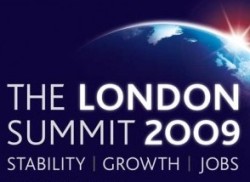LEADALL: G20 leaders launch crisis summit
 The leaders of the world's big economies launched a summit on the global economic crisis in London Wednesday with a dinner at the residence of the meeting's host, British Prime Minister Gordon Brown, and a reception at Buckingham Palace.
The leaders of the world's big economies launched a summit on the global economic crisis in London Wednesday with a dinner at the residence of the meeting's host, British Prime Minister Gordon Brown, and a reception at Buckingham Palace.
"We are within a few hours, I think, of agreeing on a global plan for economic recovery and reform," said Brown ahead of the summit's formal sessions of the Group of 20 (G20) leading industrialized nations and major emerging economies on Thursday.
But fresh signs of tensions between the leaders on how to tackle what is the world's biggest economic downturn since World War II emerged on the eve of the summit, which is being held in London's vast trade centre on the banks of the River Thames.
Winding up his first day on the world stage, US President Barack Obama pledged to do all he could to face down the global recession, highlighting the consensus that had been reached among the G20 leaders in the run-up to the summit on the global economic crisis.
But at a joint press conference German Chancellor Angela Merkel and French President Nicolas Sarkozy threw down the gauntlet on market reform, insisting that the summit needed to act now to tighten the global regulatory system.
"The United States is committed ... to doing whatever it takes to stimulate growth and demand, and to ensure that a crisis like this never happens again," Obama said at another joint press conference with Brown.
The president also rejected talk of deep divisions between the world's big economic powers, while he also laid out new foreign policy directions for his administration.
The differences between world leaders attending the G20 meeting had been "vastly overstated," Obama said.
But speaking at a joint press conference with Sarkozy, an unusually combative Merkel said the time for laying "the foundations for the new financial architecture is now."
The heads of the G20 governments, which also include those of Canada, Italy, China and India, gathered in London for the summit against the backdrop of an unprecedented security alert in the British capital to deal with mass demonstrations.
While protestors clashed with police outside the Bank of England in London's financial centre, anti-war protestors descended on the US embassy.
On his first trip outside North America since becoming president, Obama agreed at his first face-to-face meeting with Russian President Dimitry Medvedev for talks on a new nuclear arms deal.
The agreement formed part of an effort on the part of both Moscow and Washington to begin a new chapter in US-Russian relations, which hit a low point during the presidency of George W Bush.
For many world leaders, the London summit represents their first chance to meet the new US chief executive, as Obama also held talks with Chinese President Hu Jintao.
The US and Chinese leaders also signalled plans to open a new dialogue between Washington and Beijing by committing themselves to working together to tackle the economic crisis. Obama is to visit both China and Moscow later in the year.
In his remarks to reporters, Obama also raised hopes for a more open dialogue with Iran as wells as calling for steps to secure a lasting peace between the Palestinians and Israelis and to stabilize and rebuild Afghanistan.
At their joint press conference, both Brown and Obama emphasized their concerns for the human fallout from the global recession and called on the summit to agree to reforming the rules governing international markets.
Commenting on reports of a rift between the US and Europe over Washington's calls for additional fiscal stimulus packages to help spur growth, Obama said governments around the world have launched their own plans for warding off the recession.
"I think there's broad recognition that in the midst of the greatest crisis we have seen since the '30s, that governments are going to have to act, and certainly the US does not intend to act alone - and we are not," said Obama.
Acknowledging that 2009 was likely to be a difficult year for people around the world, Obama said that people were concerned about "losing their jobs, losing their homes losing their savings and losing their pensions.
"We have a responsibility to act with a sense of urgency," he said.
Brown said that he and Obama had agreed that the world leaders had to clean up the banking system so that an economic recovery could take hold.
But the two leaders also expressed optimism about the London summit reaching agreement on world market reform and improved international economic coordination to tackle the global recession. (dpa)